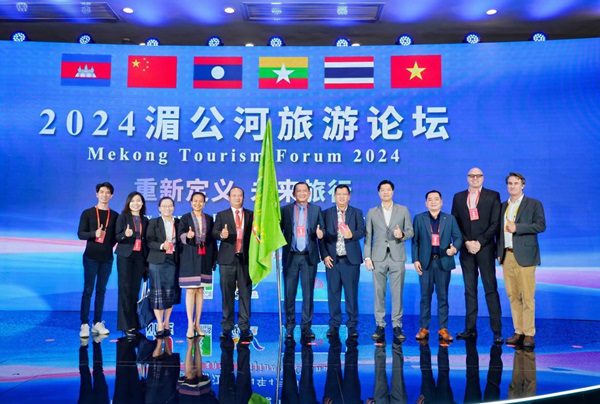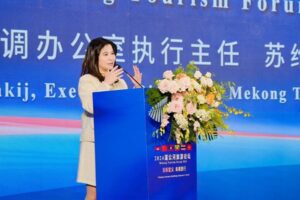 In a stirring address at the 2024 Mekong Tourism Forum, Vice Minister Zhang Zheng from China’s Ministry of Culture and Tourism laid out a visionary blueprint for the future of tourism in the Greater Mekong Subregion (GMS), heralding a new era of recovery, cooperation, and sustainable development. The speech, imbued with optimism and strategic foresight, underscores a pivotal moment for a region on the cusp of a significant tourism revival.
In a stirring address at the 2024 Mekong Tourism Forum, Vice Minister Zhang Zheng from China’s Ministry of Culture and Tourism laid out a visionary blueprint for the future of tourism in the Greater Mekong Subregion (GMS), heralding a new era of recovery, cooperation, and sustainable development. The speech, imbued with optimism and strategic foresight, underscores a pivotal moment for a region on the cusp of a significant tourism revival.
A Unified Vision for Mekong’s Tourism Revival
In the lush landscapes of the Mekong, where six nations converge, Vice Minister Zhang depicted a future where these countries emerge as leaders in global ecotourism. His address celebrated the astonishing rebound of the region’s tourism sector, highlighted by a surge in inbound and outbound travellers. In 2023 alone, China witnessed a 249.2% increase in inbound tourists, with figures nearing pre-pandemic glory. Notably, about 10% of these travellers explored the five Mekong nations, underscoring the region’s integral role in China’s tourism ecosystem.
Strategic Alliances Strengthen Regional Bonds
As Vice Minister Zhang eloquently shared, China’s diplomatic tact and emphasis on “neighbouring diplomacy of affinity, sincerity, and tolerance” have fostered deeper bonds within the GMS. This approach has facilitated substantial visa exemptions and enhanced the ease of travel, thereby boosting tourism flows and cultural exchanges.
The Vice Minister proudly referenced China’s role in spearheading initiatives to elevate service standards and visitor experiences across the region. This includes leading tourism research, launching marketing campaigns, and fostering tourism training programs, which are instrumental in revitalizing the local economies devastated by the recent global crises.
Towards a Green and Tech-Driven Future
Looking forward, Vice Minister Zhang’s speech delineated a three-pronged strategy to recover and invigorate the tourism sector with innovation and sustainability at its core. He urged enhanced cooperation to build a cohesive regional tourism brand that leverages the Mekong countries’ unique ecological and cultural assets.
The strategic vision includes harnessing cutting-edge technologies to create more engaging and efficient travel experiences. Initiatives like the “Digital Axis System” in Beijing and the 5G-enhanced smart tourism in Lijiang are pioneering examples of how technology can transform tourist interactions.
Celebrating Milestones and Forging Ahead
2024 marks significant regional anniversaries: 30 years of the GMS Tourism Working Group and a decade of the Mekong Tourism Coordination Office. These milestones reflect the enduring spirit and resilience of the GMS cooperative efforts and offer a moment to redefine and realign their goals towards more inclusive, sustainable, and profitable tourism trajectories.
Echoing Unity and Resilience
In conclusion, Vice Minister Zhang’s words at the forum were more than ceremonial; they were a clarion call to all stakeholders within the Mekong region to embrace a future characterized by unity, innovation, and shared prosperity. His optimistic outlook and detailed path forward exemplify China’s commitment to participating in and leading the charge for a sustainable and thriving tourism economy in the Greater Mekong Subregion.
As the forum concluded, the message was clear: the Mekong region is bouncing back and poised to set benchmarks for global tourism practices. With continued collaboration and strategic innovation, the Mekong could lead the world in ecotourism and become a beacon of cultural and environmental stewardship.
Written by: Supaporn Pholrach























